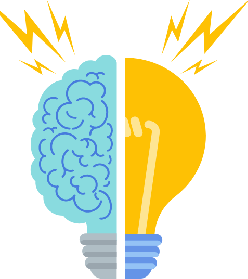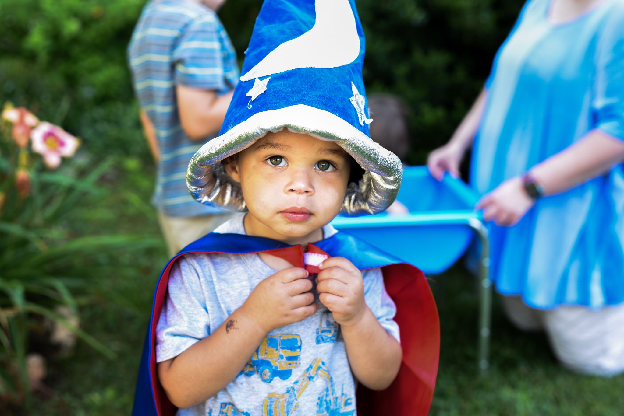What Affirming Parents Need to Know About Autism
I once asked Autistic occupational therapist Sarah Selvaggi-Hernandez what she’d like to say to parents of newly diagnosed Autistic kids, and here’s what she said:
I would want to tell you that you have a magical, beautiful, perfect, Autistic child. And the way that they move through this world, and understand the world around them - and the world inside of themselves - is so intuitive and unique. And I'm so glad that they have you, Mom, Dad, parent, caregiver, Aunt, Uncle, Grandma, Grandpa. I'm so glad that they have you. Because I can see how much you love them. And I'm going to tell you that as an Autistic person [...] I love them too.
The Problem Is
The problem is, this is likely so far from what you were told when your child was diagnosed as Autistic. If you were told anything that made it seem like your child was less than fully human - that they lack empathy, or use others as tools, that they aren’t capable and competent - then you, like many, found yourselves in the hands of poorly informed providers who likely caused so much unnecessary worry and harm.
And we want to correct the course with you.
I’m not here to tell you that being Autistic is your child’s superpower. They don’t need a superpower to be worthy exactly as they are.
I’m also not here to tell you that it’s easy to support an Autistic person in a world that wasn’t created for them. By most accounts, it isn’t.
I’m simply here to say that being Autistic is neither good nor bad. It’s profoundly neutral. Autistic people have their own ways of learning, of connecting with each other, of moving their bodies, and of learning about the world. Once we better understand what it means to be Autistic, we can better support our Autistic kids as their fullest, most authentic versions of themselves.

Identity-First Language
Let’s start with language. I’m an occupational therapist by training, and was taught in graduate school to separate the Autistic child from their autism by saying “child WITH autism.”
As a culture, we use person-first language for all things we deem bad. We say “a child WITH cancer.” (As we should.)
But for things that are okay to be, we use identity-first language. We say “a neurotypical child.” “A healthy child.” “A bright child.”
Research shows that person-first language may even make stigma worse.
And what’s more, every survey and study I’ve found shows that Autistic adults overwhelmingly prefer to be called “Autistic.” The theme is that they can’t separate who they are from being Autistic. And trying to force the separation can be shaming for their identity.
If I ever met an Autistic adult who preferred to be called a “person with autism” I would 100% honor it. This has yet to happen to me in years of interviewing Autistic people. So out of respect for the empowering idea that it’s 100% okay to be Autistic, at Learn Play Thrive we use identity-first language and encourage you to do the same.
It’s tricky at first. People who don’t know better may think it sounds outdated, like you never learned about person-first language. But I assure you the tides are turning. And you can be a part of it by gently educating those around you, too.
Takeaway: It’s okay to say “Autistic.” In fact, most Autistic people prefer it because being Autistic is part of their identity.

The Double Empathy Problem
Here’s something almost no one tells us: Taking an Autistic person’s perspective is hard for a non-Autistic person.
We’ve been hearing for so long that “Autistic people are bad at perspective taking… and social skills…” But just over a decade ago, Autistic researcher Dr. Damian Milton theorized that this wasn’t exactly right.
Sure, Autistic people have trouble taking the perspective of non-Autistics. It’s also hard for Autistic people to use the social behaviors that make neurotypicals feel comfortable.
But he theorized that this went the other way as well, and that non-Autistic people had just as much trouble taking the perspective of Autistic people, and using social skills that made them feel comfortable.
Research proved him right. Basically, no one is very good at perspective taking across neurotypes.

Vocab sidenote: Your "neurotype" is just how your brain works. Being Autistic is one neurotype. ADHD is another.
"Neurotypical" is theoretically a neurotype too... but it's really a hard one to pin down, because everyone's brain is so different there's not exactly a "typical". I use "neurotypical" to mean a person who has no clear divergence.
Take me for example: I feel like for the most part, the world is set up for the way I think and learn. The way my brain is wired doesn't make living in this world extra difficult.
So we aren’t good at perspective taking across neurotypes. And neurotypical professionals have written most of the rules. They’ve watched Autistic behaviors, misinterpreted them, pathologized them, and handed them to you as a scary list of “red flags” for a “disorder.”
Which takes us back to the quote at the beginning of this post.
If my colleague Sarah diagnosed your child, she’d have said this:
Really just sink in to yourself, and your intuition as a parent, and look at your child and how beautiful they are. And the way that they move when they’re allowed to move, when they’re allowed to be, and when they’re allowed to simply exist. That’s true identity. Who is that child?
Hold that fully free version of your child in your heart for a moment as we move into this next part.
It’s Totally Okay to be Autistic.
Being Autistic is one of many ways to exist in the world. But professionals have a long history of teaching Autistic people to mask their true selves.
Masking is when we ask Autistic kids to perform neurotypical behaviors that aren’t natural for them. This includes things like:
-
Being told to make eye contact, which makes it look like they are listening to neurotypicals, but for most Autistic people, makes it harder to actually listen because the visual input is so distracting.
-
Being asked not to move their bodies in the ways that are natural and regulating to them (“stimming”). Not being allowed to use their movements to self-stimulate makes it harder for them to really regulate their bodies to feel safe, present, connected, or ready to learn.
-
Being asked to perform neurotypical social behaviors like back-and-forth conversations, instead of conversing in more natural ways for them. For some Autistic people, sharing lots of information about a topic of interest might be the most natural way to connect (infodumping / monologuing). For many, using scripts that hold emotion might be how they share themselves and their inner world.
I used to teach neurotypical social skills to my Autistic clients. I argued that I was helping them meet their own goals of making friends. But my colleague Autistic SLP Rachel Dorsey helped me see how short-sighted this was.
The “skills” may work for a moment, for a situation, but they don’t help the Autistic child achieve true connection and belonging in the long run.
Also, masking is linked to really bad mental health outcomes in research. And I know that your deepest desire is for your child to feel well and whole. Not to try and change themselves - at their own expense - for others.
Many Autistic people have to mask at different times in their day, even just to stay safe. We hear this a lot from Black and Brown Autistic people in the United States, especially in regards to being in school - where they are more likely to receive harsh punishments than their White Autistic peers - and interacting with the police, which can be deadly.
Just know that just masking ourselves as Autistic people of color [...] is harder than people want it to be because of the fact that we have to mask ourselves every day, because we are Autistic, because of our skin color and ethnicity, and don't forget our sexuality too, or gender, or class. It's a lot of masking to do that people just don't want to see, especially some people who are white and Autistic. They don't really understand how much masking we have to do to just survive.
But nevertheless, we want to be careful that we aren’t teaching our Autistic kids that they have to mask to be loved, accepted, and included.
A vastly better approach is to find spaces where the child can be authentic and included. Sometimes this is in Autistic-only spaces, where the child can be the neuro-majority for a change.
Sometimes this is in friendships with other neurodivergent kids. Some of the sweetest, most accepting friendships I’ve witnessed as a parent are the ADHD kid + Autistic kid matches. And sometimes it’s in neurodiverse groups where everyone connects over a shared interest.
Which leads us to your child’s passions!

Your child’s passions are sacred.
You may have had a therapist tell you to hide the flashlights your child loves so your child can learn other things. I’m here to tell you to get the flashlights back out.
To me, the most alarming part of the way the autism criteria is worded is the phrase “restricted and repetitive behaviors.”
Could there be any more pathologizing way to say that your child has intense passions that they can focus on for long periods of time and are excited to learn deeply about?
Despite what the diagnostic criteria would have you believe, difference is not pathology.
When I ask Autistic adults what they wish had been different about their childhoods, the most common answer I get is some variation of “I wish I’d had more time to spend focusing on the things I loved.”
Autistic children are learning when they play. Even if we can’t tell how by watching.
Your child doesn’t need to spend the hours of their childhood focused on the things that are hardest for them. They need time and space to grow their passions and flourish.

Let them know they are Autistic
There are so many other things that I could say about being Autistic. But for now, I want to end by addressing the question:
“Should I tell my child they are Autistic?”
Here are the experiences of three of my podcast guests, who found out they were Autistic in adulthood. These are incredibly common stories.
People around me didn't seem to struggle in the same ways that I did, and were constantly pushing me to do better, accusing me of being lazy, or not trying hard enough. Even when I was putting in extra effort, I was falling short of what other people expected of me, and that really did a number on my mental health. If you're working so hard to do your best and you're just constantly told that your best isn't good enough, and you need to try harder. I slowly really lost myself and been tricked into believing that I was flawed, and I wasn't good enough. Learning I was Autistic late in life was like hitting the reset switch in my life, and I realized for many years I've been working against myself, instead of with myself [...] It was that pivotal moment where I realized that I need to be able to feel proud of who I am.
I grew up thinking I was a weird kid, and just nobody liked me. But [when I learned I was Autistic as an adult] I realized that this is just how my brain works. And there actually were other people who were like me a little bit, and they did like me.
[Since being diagnosed as Autistic] I've had a massive growth spurt personally, professionally within the last three to four months, and I've gone through a lot of change. Let me tell you, from a girl that struggled for so long with self-esteem, feeling different, and always feeling like I'm on the outside looking in, like, 'How do people do what they do?' For me to be able to be at a point today where I can embrace my quirks and my difficulties. But I do have a lot of strengths, and I actually believe that today. I never used to believe that.
The book “Just Right for You” by Melanie Heyworth is great for younger kids. And we love “The Awesome Autistic Go-To Guide: A Practical Handbook for Autistic Teens and Tweens” by Yenn Purkis and Tanya Masterman for adolescents.
You belong here.
Thanks for taking the time to dive into identity-first language, the double empathy problem, Autistic passions, and disclosing a diagnosis. We have so much more we can’t wait to share.
If you’re ready for your next step, join our Facebook group or take a deep dive into strengths-based parenting with an affirming training!
Want a handout version of this page? Click here.
For this handout in Spanish, click here.
About the author
Meg Ferrell (she/her) is an occupational therapist and the founder of Learn Play Thrive and Learn Play Thrive Parents. She cares deeply about person-affirming therapy and has spent the last five years interviewing and learning from Autistic adults to try and change the way OTs, SLPs, and mental health professionals support Autistic kids in their work. At LPT Parents, Meg is on a mission to bring accessible, affirming strategies directly to parents.